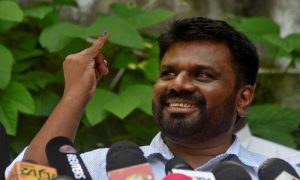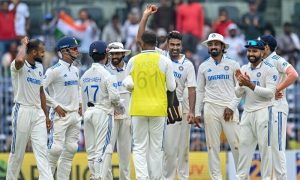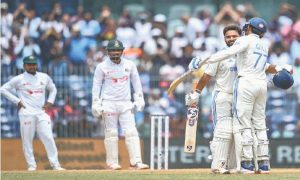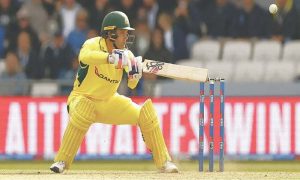

Justice Athar Minallah on Tuesday said the state had to protect the judges and the judiciary’s independence as the Supreme Court took up a suo motu case pertaining to allegations of interference in judicial affairs.
A six-member bench resumed hearing a case pertaining to allegations made by six Islamabad High Court (IHC) judges regarding interference by the country’s security apparatus in judicial matters.
Headed by Chief Justice of Pakistan (CJP) Qazi Faez Isa, the bench included justices Minallah, Mansoor Ali Shah, Jamal Khan Mandokhail, Musarrat Hilali and Naeem Akhtar Afghan. The proceedings were streamed live on the SC’s website and its YouTube channel.
In late March, it emerged that six IHC judges — out of a total strength of eight — wrote a startling letter to the Supreme Judicial Council (SJC) members, regarding attempts to pressure judges through the abduction and torture of their relatives as well as secret surveillance inside their homes.
The letter was signed by judges Mohsin Akhtar Kayani, Tariq Mehmood Jahangiri, Babar Sattar, Sardar Ejaz Ishaq Khan, Arbab Muhammad Tahir and Saman Rafat Imtiaz.
A day later, calls had emerged from various quarters for a probe into the investigation, amid which CJP Isa summoned a full court meeting of the SC judges.
In a meeting, Prime Minister Shehbaz Sharif and CJP Isa had decided to form an inquiry commission, which was later approved by the federal cabinet.
However, ex-CJP Tassaduq Hussain Jillani — tasked to head the one-man inquiry commission — recused himself from the role, urging Justice Isa to “resolve the issues raised in the letter at the institutional level”. At the same time, the top court took suo motu notice of the matter.
Justice Yahya Afridi, who was among the seven-member bench that presided over the last hearing, had recused himself from the case. At the previous hearing, CJP Isa had asserted that “any attack” on the judiciary’s independence would not be tolerated while hinting at forming a full court to hear the case.
Besides the suo motu, the SC has also taken up more than 10 petitions and applications seeking its intervention, which were filed by various bar associations and had been clubbed together.
Today, Attorney General of Pakistan (AGP) Mansoor Usman Awan appeared before the apex court.
The apex court ordered the petitioners — the bar councils and associations — to submit a response by the next hearing on May 7, adding that it would be appropriate if it was unanimous.
It also said that the federal government and the intelligence agencies could submit their responses through the AGP if they wanted.
The hearing
At the outset of the hearing, CJP Isa clarified that prior to the last hearing, the SC’s bench formation committee had “decided that all available judges in Islamabad should immediately convene”.
“There was no pick and choose; whoever was available was put together,” he observed, adding that Justice Afridi had recused himself. Recalling that he had hinted at a full court hearing the matter, Justice Isa said that it could not be convened as two judges were unavailable.
The top judge noted that there was “so much polarisation in the country” and that “people may not be so interested in the independence of the judiciary but in their own particular viewpoint to prevail”. Reiterating his remarks from the previous hearing, Justice Isa reiterated that “attacks” against ex-CJP Jillani were “upsetting”.
“If somebody can impose a will upon this court, that is also interference; interference can be from within, from without, from intelligence agencies, from your colleagues, from your family member, from social media, from everybody else,” CJP Isa said.
“A judge’s judgment and order shows, speaks, shouts how much interference there is or isn’t; how much independence there is or isn’t,” he added.
The top judge remarked, “I am not responsible for the history of the Supreme Court. I am only responsible from the day I became chief justice. I have gone ahead with an inclusive approach.” He recalled that he had summoned a full court meeting which had not been done so in years.
The chief justice then asked AGP Awan if he had gone through the recommendations made by the IHC judges, to which the latter replied in the negative. Justice Isa then asked Awan about how to proceed with the matter.
Here, Justice Minallah remarked: “These are not recommendations or suggestions but a charge sheet.”
After the AGP read aloud the proposals, CJP Isa observed, “We should not interfere in the high court’s work. The results of interference in high courts’ matters have not been good in the past.”
Here, Justice Minallah noted that the IHC judges had alleged “continuous meddling” and asked if their recommendations were unanimous. Awan replied that it seemed so, at which the judge observed that no judge had disagreed.
The SC then ordered that the proposals made by the IHC judges be made public. Justice Isa said, “When everything is airing on the media, we may make this public as well.”
When the chief justice asked if a high court was not empowered by the Constitution to implement the said suggestions, AGP Awan replied that it had the authority to take action on all the points.
Upon Justice Shah pointing out that IHC’s Justice Ejaz Ishaq had also sent an additional note, Justice Minallah ordered the AGP to read it aloud.
Here, CJP Isa wondered if the SC could order the high courts. Justice Minallah then said that the IHC’s proposals should be appreciated. “When there will be no answer, the judges will not be fearless,” he said, stressing that the apex court should review the matter.
Justice Isa observed that the SC should limit itself to the high courts’ suggestions and not act on those made by every other person.
“I will never accept any interference from any source and there has not been a single complaint since my assumption of this office to me or the SC’s registrar,” the top judge remarked.
He wondered if the presidents of lower judiciary’s bar associations “forcing their way into the judges’ chambers” did not equate to interference.
At this point during the hearing, Justice Minallah emphasised: “If the state becomes the aggressor against a judge, that is what all the high courts are highlighting and that is a serious matter.
“The high court of Lahore is endorsing what the IHC has said […] and we all know that it is happening and has happened,” he added.
Justice Minallah highlighted that the judges “fear reporting because […] since the last hearing, what has happened to an IHC judge; his personal data which cannot accessed by a private person was put on social media”. “That is an intimidation,” he observed.
“The state is to protect the judges and independence of the judiciary. When it becomes the aggressor, which each high court is saying; that is what is the issue and it is happening.
“It is a phenomenon that has happened for the last 76 years and this is what each high court is endorsing. It is happening today,” Justice Minallah observed.
Here, Justice Shah, noted that the matter had landed before the SC and questioned if the apex court could “just brush aside” the matter.
“We should empower the high courts. We are, by interfering in this matter, actually empowering the high courts, the district judiciary, the entire judiciary; I don’t think it’s interference in any matter,” he observed.
Justice Shah noted there was a need to “lay down a court which is a clear firewall against all sorts of excesses” and that a “system” needed to be put in place rather than dealing with individual incidents.
At this point during the hearing, Justice Mandokhail said that “especially two of our learned members of the bench have been targeted” since the SC took up the matter. “This is not interference. This is a threat.
“Leave the high court judges aside […] the notice we have taken; what is happening with us? Can there be independence in this manner?” the judge asked.
Justice Minallah then remarked that the “presumption and entire onus was on the state” when data of judges’ family members was “stolen” from government departments“ such as immigration and the National Database and Registration Authority (Nadra).
“There are judges we know to whom it is just said ‘your child studies at so and so place’ and it is the state which is doing it,” he added.
At this point during the hearing, Justice Hilali wondered why all high courts did not implement the suggested actions by themselves and why they were seeking the SC’s permission.
Justice Shah then observed that the high courts had “all powers, including that of contempt of court [notice]”, stressing the need to empower each court of the country.
He said the current suo motu case was “doing wonders” as it had led to the judiciary “mustering the courage” to write the letter.
Here, Justice Minallah termed the Balochistan High Court Bar Association’s response as “most interesting”.
“The state is to protect the independence of the judiciary. There has been a partnership between the judiciary and the establishment for the past 76 years. That culture continues,” he said.
CJP Isa then responded: “I don’t know. At least there’s no culture here. […] If there was any interference in my work and if I could not withstand the pressure, I would go home.”
He went on to recall that he had been the Balochistan High Court chief justice for five years and offered to ask the judges there about any alleged interference.
“Since I have been a judge here (at SC), I have fought for the independence of the judiciary from within,” Justice Isa asserted.
“And the greatest threat to independence was from the Supreme Court, not from the outside, in my opinion. I have lived through it; I have experienced it so these are not empty words. Please do not include me in the 76 years of Pakistan’s history and there are many such persons who should not be included.
Justice Minallah agreed with CJP Isa: “I haven’t condemned all. There have been exceptions.” He added that “no one could influence a single judge” during his tenure as the IHC chief justice.
Concluding today’s hearing, the SC ordered the lawyers’ bodies, which were the petitioners, to submit their responses on the matter by the next hearing.
It suggested the bar councils and associations submit a unanimous response, adding that any differing viewpoints could be mentioned separately.
Further, the apex court said that if the federal government wished to submit a response or any proposals, it may do so through the AGP. Intelligence agencies were also given the option to submit a response on the matter through the AGP.
The court stated that no new petitioners would be made respondents in the case. Subsequently, the hearing was adjourned till May 7.
Contents of letter by IHC judges
Dated March 25, the letter was signed by IHC Justices Mohsin Akhtar Kayani, Tariq Mehmood Jahangiri, Babar Sattar, Sardar Ejaz Ishaq Khan, Arbab Muhammad Tahir and Saman Rafat Imtiaz.
It mentioned seven instances of alleged interference and intimidation “to influence the outcome of cases of interest” by the intelligence officials, pointing out that when two out of three judges in the bench hearing the plea to disqualify PTI leader Imran Khan for concealing his alleged daughter opined that the case was not maintainable, they were pressured by “operatives of the ISI” through friends and relatives.
The situation got so stressful that one of the judges had to be admitted to hospital due to high blood pressure, the letter said.
According to the six judges, the matter was brought to the notice of the IHC chief justice and the then-CJP. The former informed the judges that he had “spoken to the DG-C of ISI and had been assured that no official from ISI will approach the judges of the IHC”.
The letter complained that “interference on the part of intelligence operatives” continued even after IHC CJ’s assurance.
It also referred to the abduction of an IHC judge’s brother-in-law by armed men who claimed to be ISI operatives. The victim was “administered electric shocks” and “forced to record a video” making false allegations, apparently against the judge.
“Subsequently, a complaint was filed against the judge of IHC before the SJC, accompanied by an orchestrated media campaign to bring pressure to bear upon the judge to resign.”
The letter revealed that in May 2023, an IHC inspection judge reported to the chief justice that district court judges were being intimidated and crackers were thrown into the house of one additional district and sessions judge.
The judge was even called to the IHC to verify the claims which he confirmed. But instead of probing the allegations, the judge “was made officer on special duty and transferred to IHC, before being sent back to Punjab as he was a judicial officer on deputation”.
The letter said that last year, during routine maintenance, an IHC judge found that his official residence had been bugged with spy cameras concealed in his drawing room and bedroom.
When data from surveillance equipment was recovered, it showed that “private videos of the judge and his family members” were stored. “The matter was brought to the attention of the IHC chief justice. There has been no determination of who installed the equipment and who is to be held accountable,” the letter added.
Along with their letter to the SJC, the six judges also attached copies of letters written to Justice Farooq on May 10, 2023 and Feb 12, 2024.
The letters mentioned, among other complaints, efforts of Inter-Services Intelligence (ISI) personnel to pressurise IHC judges and probe into the tax records of at least one judge “to seek a certain outcome”.
They added that it was imperative to determine whether there was a “policy on the part of the executive … implemented by intelligence operatives” to intimidate judges.
“[The] allegations of interference by operatives of ISI have been dealt with and relief has been granted to a former judge of IHC who was wronged. We believe that while such action was necessary, it may not be sufficient,” the letter said about Justice Siddiqui’s case.
The judges noted that the SJC’s code of conduct for judges did not outline the response to such incidents “that are tantamount to intimidation and interfere with judicial independence”.
They called for a judicial convention to discuss the interference of intelligence officials “that undermines independence of the judiciary”.
The consultation would help the Supreme Court to determine a course of action that judges could take “when they find themselves at the receiving end”, the letter said.
More to follow






